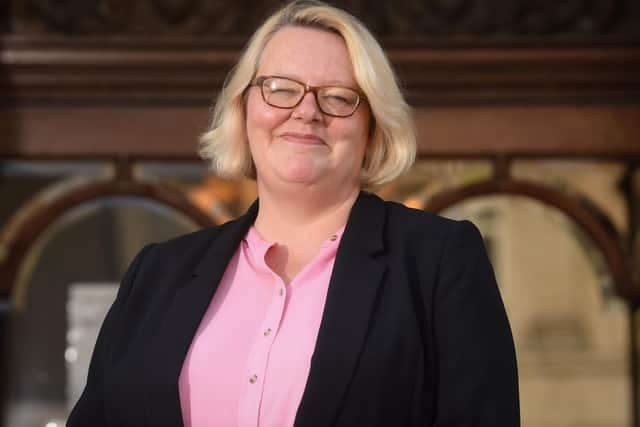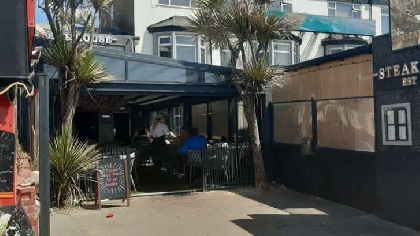
Blackpool Council’s finances are ‘on the edge’ the town’s opposition leader has warned after new figures showed reserves have dropped to just £76,000.
Coun Paul Galley, leader of the Conservative group on the council, said: “These figures are the worst I’ve ever seen, the Labour Council is now over spending in almost every area.
“These massive overspends are simply not sustainable putting the very existence of Blackpool Council at risk.”
But council leader Coun Lynne Williams blamed Tory government cuts over the past 14 years for spending woes and said the council was working hard to keep its finances afloat despite massive pressure on services.
She blasted back: “The legacy of Coun Galley’s failed Conservative Government is a terrible one for our community that we are doing our best to overcome.”
The latest financial report agreed by the council’s executive shows working balances – cash kept in reserve to cushion against any financial hiccups – have plunged from £7m at the end of the last financial year to £76,000.
This is due to forecast overspends in Adult Services of £3.6m and Children’s Services of £3.3m.
Coun Galley said: “The fact that we are predicted to have reserves of just £76,000 against a target of £7m at a time the council owes half a billion with interest payments alone estimated at a staggering £24.4m per year demonstrates the Labour Group are sleepwalking Blackpool Council to the very edge of insolvency.
“This will mean the people of Blackpool will suffer with worse services and increased council tax.
“I would urge the council leader Coun Lynn Williams to personally review all the services, asking the tough questions around the way some of the services are being managed at a senior level and encouraging staff to lead in reforming services such as encouraging council departments to carry savings over getting rid of the ‘spend it or lose it culture’.
“If the Labour Group don’t act soon, within three years Blackpool Council will be bankrupt.”
Coun Williams said councils across the country had made £24.5bn of savings over the last 14 years under the Conservative government, with the figure for Blackpool £219m.
She said: “Demand for services is increasing across the country, since 2019 there has been a real terms increase in cost of 26 per cent for children’s social care, 64 per cent for home to school transport for children with SEND, 18 per cent in adult social care and 77 per cent in homelessness.”
Coun Williams said in this context the council’s finances “are well managed and closely scrutinised to ensure we can maximise the quality of the services we provide while at the same time robustly seeking additional government funding.”
She added despite the cuts, the council continued to pursue its £2bn investment programme to create jobs, boost tourism and build new homes.
She said: “Coun Galley refers to the council’s borrowing but neglects to mention the borrowing has been invested in steel, bricks and mortar, is secured, and most importantly that the council’s assets are double the value of that indebtedness. Interest payments are budgeted for and the forecast is break even for 2024/25.
“None of this would have been achieved if Coun Galley had his way. He and his party don’t have a vision nor ambition for our town. We are not sleep walking anywhere, we are purposefully continuing with the regeneration of our town.”
A report to the executive by the council’s director of resources Steve Thompson warns the forecast for 2024/25 “shows a deterioration in the council’s financial standing.”
It says plans are in place to improve the situation in order to achieve the target of restoring working balances to £8m by March 31 2025.
The report says: “The council’s revenue budget for 2024/25 set a target level of General Fund working balances of £8m by 31 March 2025 and it will continue to work towards this.
“Earmarked Revenue Reserves at the start of the financial year stood at £31.6m, though with known in-year commitments against this the balance will fall to an estimated £24.5m by the end of the year.
“This should still be sufficient to underwrite the current year’s financial risks alongside a financial plan in place for the council’s wholly-owned companies.”
Last year the council overspent by around £8m on delivering services, but better financial performances in other areas meant it remained within budget.

 Blackpool drunk-driver jailed after Christmas Day collision seriously injured five
Blackpool drunk-driver jailed after Christmas Day collision seriously injured five
 Blackpool drugs gang sentenced to more than 100 years in prison
Blackpool drugs gang sentenced to more than 100 years in prison
 Woman in her 70s dies following collision with bin lorry in Freckleton
Woman in her 70s dies following collision with bin lorry in Freckleton
 Fylde Council announces preferred bidder for St Annes swimming pool
Fylde Council announces preferred bidder for St Annes swimming pool
 Solar farm approved on Fylde / Preston border
Solar farm approved on Fylde / Preston border
 Blackpool eatery again told it must pull down extesion after latest refusal
Blackpool eatery again told it must pull down extesion after latest refusal
 Decision made on plans to transform former Poulton Masonic Hall into flats and bar
Decision made on plans to transform former Poulton Masonic Hall into flats and bar
 Free flu vaccinations available at walk-in clinics across Blackpool
Free flu vaccinations available at walk-in clinics across Blackpool








